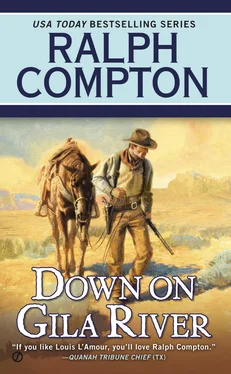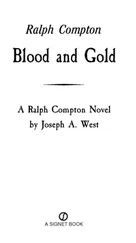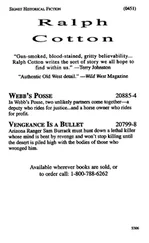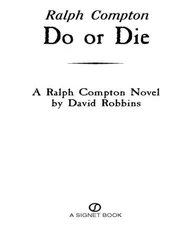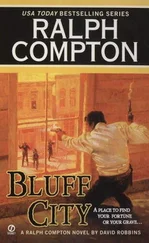The sheriff didn’t hesitate. “I want you to mend the broken heart of a little girl.”
“Mending womenfolk’s broken hearts is a tad out of my line,” Sam said, taken aback. “The fact is, I never could trust a man who can look a pretty woman in the eye.”
“You’d be doing a service to the girl’s parents, this town, and me personally,” Moseley said. “I’d be mighty grateful enough that I’d help you find that restaurant job you want.” He puffed up a little. “I have friends in Silver City, you know. Powerful friends.”
Sam needed the twenty dollars, and after his initial shock he wasn’t about to talk himself out of it.
“What do I have to do to mend the kid’s broken heart?” he said. Then, his jocular mood aided by the second beer, he said, “Shoot her?”
Moseley’s smile was wintry. “No, nothing as drastic as that. I’ll let her father explain all to you. His name is Mr. Jerome T. Meriwether and he’s the right honorable mayor of this fair town.”
“Well,” Sam said, getting to his feet, “I’m ready to meet the gentleman.”
Moseley shook his head. “Slow down, pardner. I’ll take you to him after the hangings.”
Sam sat again. “Suits me, Sheriff.”
“Go over there and get yourself some roast pig and a beer,” Moseley said. “As soon as the three criminals are bedded down, I’ll introduce you to His Honor.”
Without another word the sheriff stepped off the porch and headed toward the jailhouse, his walk long striding and arrogant. Sam watched the man go and felt a shiver, as though a dark shadow had fallen over him.
Chapter 8
The local newspaper, a single sheet published three days after the hangings, summed up why Sheriff Vic Moseley was not popular with the crowd who blamed him for the event’s low entertainment value.
THREE MEN HURLED INTO ETERNITY IN A MOMENT
One Man’s Last Words: “Go to H—”
Necks Cleanly Broken, Says Hangman
Roast Pig Undercooked
Sheriff Moseley Blamed for Uneatable Hog
But both the hangings and the headlines were yet to come when Sam Sawyer strolled over to the gallows and poured himself a beer from one of the barrels.
Jasper Perry was already on the gallows, testing the three ropes to make sure the hemp hadn’t been stretched. When he saw Sam he hopped down the steps like a great black crow and shook his hand warmly.
“Mr. Sawyer, how nice of you to come,” he said. “Is the fair Mrs. Stewart with you?”
“No,” Sam said, “I came by myself.”
“A great day, Mr. Sawyer,” Perry said. “I would say a most singular day that’s of the greatest moment.”
“Indeed, it is, Mr. Perry,” Sam said, wishing that the hangman would get back on the gallows where he belonged.
“Good drops and clean breaks, that’s what you’ll see today,” Perry said. “My professional pride would have it no other way.”
A woman in the crowd yelled, “Hey, Mr. Hangman, is it true that one of them boys wore the gray?”
“Set your mind at rest, dear lady,” Perry said. “None of the miscreants served our noble cause.”
“I’m a Yankee and proud of it,” the woman said, and flounced away.
“Sadly, in my profession, you just can’t please everybody, Mr. Sawyer,” Perry said, watching the woman go. “Even the condemned can be demanding.”
“I hear there will be speechifying afore the drop,” Sam said.
“Yes, there always is,” said Perry. “Sometimes a condemned man can be quite eloquent when he speaks of ardent spirits”— he smiled—“and even more ardent women.”
The hangman laid his cold, bony hand on Sam’s shoulder and said, “I must get back to work, but I set store by your opinion, Mr. Sawyer, so later please tell me what you think of my work. It is an art, you know.”
Sam nodded. “I surely will,” he said, but he’d no intention of watching the hangings or ever seeing Jasper Perry again.
* * *
“Hell, did you watch the hangings?” Vic Moseley said.
Sam shook his head. “No, I didn’t.”
“You didn’t miss much. The thing was over before it began, so the blasted pig was raw and I got the blame for that as well as the no speechifying,” Moseley said.
“Well, you’re the biggest toad in the puddle, Sheriff,” Sam said.
Moseley might’ve taken offense at that remark, but he was venting his spleen, not listening.
“I gave them boys a bottle of whiskey and they promised to put on a good show,” the sheriff said. “What did I get? A ‘go to hell,’ that’s what I got.”
“Just don’t seem right,” Sam said. “Them takin’ a man’s whiskey under false pretenses an’ all.”
“You bet it ain’t right. If I could string up them three again, I would. And this time I’d make it last. Danged hangman should’ve known you don’t stretch a man’s neck that fast.”
For a moment Moseley stared at Sam as though he were the source of all his troubles. But then he sighed and said, “Let’s go see the mayor.”
* * *
The mayor’s combined dwelling and office was the only redbrick structure in town, a low building that had a shady porch out front lined with white wicker rocking chairs. Behind was a barn, a smokehouse, and other outbuildings.
Sheriff Moseley told Sam to wait on the porch. Then he opened the door and stepped inside. He was gone a long time, so long that Sam reckoned the lawman had forgotten about him. But Moseley eventually opened the door and stuck his head outside. “Come in, Mr. . . . uh . . . uh . . .”
“Sawyer,” Sam said.
“Yes,” the sheriff said, “of course you are. Please come in. The mayor is ready to see you now.”
Mayor Jerome T. Meriwether was a small, thin man with the furtive, shifty-eyed look of the henpecked husband. He wore a frock coat of gray broadcloth and a collarless shirt, and he studied Sam with sad, wounded eyes. A Remington revolver with a bone handle lay on the desk in front of him.
He offered no greeting, just a raspy “Has Sheriff Moseley told you what you must do to earn your twenty dollars?”
Sam hesitated a moment to collect his thoughts.
“Come, now, man,” Meriwether said. “Be brief. A simple yes or no will do. I don’t have time for dillydally, shilly-shally. You heard about the hangings? A sham, a blasted sham, and a bloody shame. Now speak up.”
“The sheriff said he wants me to mend a little girl’s broken heart,” Sam said.
“And that’s all? Come, man, let’s hear it.”
“Yes. I reckon that’s about all.”
The mayor gave Moseley an irritated look. “Why does it take Texans half the day to say five or six words?”
The sheriff said nothing, and Meriwether shook his head. “It’s a heathen way of talking.”
Sam decided he didn’t like the mayor. The man had the look of a Yankee carpetbagger, the worst of the plundering flotsam and jetsam thrown up on Southern shores after the War Between the States. But Sam was here to earn twenty dollars, not to measure the man, so he kept his mouth shut.
“Five days ago,” Meriwether said, “in this very town, Dale Johansson’s dry goods store was robbed of thirty-seven dollars and eighteen cents and a jar of stick candy. On the way out of town, the miscreants stole my daughter’s skewbald pony from my barn.” The mayor leaned across his desk. “Do you follow me so far?”
“I reckon I do,” Sam said.
“Good. Then you’re not quite as lost as you look.”
“I always know where I’m at,” Sam said.
Meriwether ignored that and said, “Soon you will behold a piteous sight, Mr. . . . uh . . .”
“Sawyer,” Sam said.
“Yes, indeed, Mr. Sawyer.” The mayor held a handkerchief to his nose and blew loudly. When he finished wiping and returned the cloth to his pocket, he said, “I will take you to meet my daughter. She’s only twelve, a mere child, and she’s heartbroken. She wants her pony back, and I’m hiring you to get it for her.”
Читать дальше
